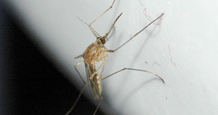News archive 2020

Joint Centre of Excellence in Environmental Intelligence hosts inaugural event
The key challenges, priorities and solutions to some of the world’s most pressing environmental issues will be showcased at a special event this week.

COVID lockdown causes record drop in CO2 emissions for 2020
The global COVID-19 lockdowns caused fossil carbon dioxide emissions to decline by an estimated 2.4 billion tonnes in 2020 – a record drop according to researchers at the University of East Anglia (UEA), University of Exeter and the Global Carbon Project.

Mapping global impacts for all vegetable oils key to sustainability
A lack of data on the environmental and social impacts of vegetable oil crops stands in the way of informed discussions about their relative sustainability, according to a new study by members of the IUCN’s Palm Oil Task Force.


University of Exeter and Medicines Discovery Catapult combine to industrialise academic medicines research
Today (November 12th 2020) the University of Exeter and Medicines Discovery Catapult (MDC) announce their strategic partnership to accelerate medicines Research & Development (R&D), creating value for the sector and enhancing translational skills.

Warming of 2°C would release billions of tonnes of soil carbon
Global warming of 2°C would lead to about 230 billion tonnes of carbon being released from the world's soil, new research suggests.

Malaria parasites adapt to survive the dry season, research shows
The main parasite that causes malaria can alter its gene expression to survive undetected in the human blood stream, new research has shown.

Leading climate scientist wins prestigious award
A world-leading climate scientist from the University of Exeter has received a prestigious award in recognition of his pioneering and innovative research.

Scientists develop algorithm to help relieve pressure on the NHS
New research suggests an algorithm could be used to help optimise the sharing of healthcare resources during the Covid-19 pandemic, preventing NHS intensive care units (ICU) from becoming overwhelmed.

New app could help schools and colleges stay open amidst Covid-19 infections
The University of Exeter, working with Petroc College and the Association of Colleges and supported by City and Guilds, have produced an online tool for forecasting the spread of Covid-19 in colleges and helping to keep buildings open for as many students as possible.

Pioneering collaborative research project helps enhance understanding of climate tipping points
Mathematicians from the University of Exeter will play a pivotal role in a new collaborative research project to help enhance our understanding of climate tipping points.

University of Exeter spin-out Neuronostics win prestigious national award
An innovative University of Exeter spin-out company, which uses sophisticated mathematical modelling to help develop treatment plans for patients with epilepsy, has won a prestigious national award.

Climate pledges ‘like tackling COVID-19 without social distancing’
Current global pledges to tackle climate change are the equivalent of declaring a pandemic without a plan for social distancing, researchers say.

Pioneering new Joint Centre for Excellence in Environmental Intelligence announce leadership team
The Joint Centre for Excellence in Environmental Intelligence has appointed its inaugural leadership team.

Recent global warming trends are inconsistent with very high climate sensitivity
Research published this week in Earth System Dynamics reports that the most sensitive climate models overestimate global warming during the last 50 years.

Surface clean-up technology won't solve ocean plastic problem
Clean-up devices that collect waste from the ocean surface won't solve the plastic pollution problem, a new study shows.

Business consultant launches confidence course for women in science
Business consultant and author Sadie Sharp is working with 100 scientists, the majority female, to help them build their confidence in a male-dominated sector.

Coconut confusion reveals consumer conundrum
Coconut oil production may be more damaging to the environment than palm oil, researchers say.

New technique in which drugs make bacteria glow could help fight antibiotic resistance
A new technique could help reduce antibiotic prescribing by predicting which drugs could be effective in fighting bacteria within minutes.

Awards for Exeter climate scientists
Two Exeter climate scientists have received prestigious awards from the Royal Meteorological Society (RMetS).

Half of the world’s population exposed to increasing air pollution, study shows
Half of the world’s population is exposed to increasing air pollution, new research has shown.

Warm springs increase risk of severe summer droughts
Warm and sunny springs – like the one just seen in the UK – can create conditions that pave the way for severe summer droughts, a new study has shown.

Exeter receives £1.2 million grant for pioneering new research hub
The University of Exeter has been awarded a grant of more than £1 million to create a new research hub to boost diagnosing and managing some of the world’s most debilitating long-term health conditions and antimicrobial infections.

Celebrating Prestigious Athena SWAN Awards
Two prestigious Athena SWAN awards have just been granted to three University of Exeter departments to recognise their commitment to gender equality.

Coronavirus is a ‘sliding doors’ moment. What we do now could change Earth’s trajectory
Professor Pierre Friedlingstein, Chair in Mathematical Modelling of Climate Systems at the University of Exeter, contributes to this article for The Conversation

COVID-19 crisis causes 17% drop in global carbon emissions
The COVID-19 global lockdown has had an “extreme” effect on daily carbon emissions, but it is unlikely to last – according to a new analysis by an international team of scientists.

University of Exeter leads “rapid response” data analysis to aid NHS during COVID-19 pandemic
Researchers from the University of Exeter and the NIHR Applied Research Collaboration South West Peninsula (PenARC), in partnership with the NHS, have developed a crucial new tool to ensure health trusts maintain sufficient levels of life-saving equipment and bed spaces during the COVID-19 pandemic.

Research to study health impact of air pollution on individuals
A crucial new project, designed to reveal the potentially devastating health impacts of air pollution on individuals, depending on their local environment, has received significant funding.

Rising research star at Exeter secures prestigious Biochemical Society award
A rising research star at the University of Exeter has received a prestigious national award, it has been announced.
.jpg)
Jet stream not getting ‘wavier’ despite Arctic warming
Rapid Arctic warming has not led to a “wavier” jet stream around the mid-latitudes in recent decades, pioneering new research has shown.

Research into ecosystem-based solutions to climate change receives philanthropic support
A project exploring how carbon capture and storage can help limit global warming to a 1.5°C temperature rise has received philanthropic funding from American organisation, One Earth.

Cutting road transport pollution could help plants grow
Cutting emissions of particular gases could improve conditions for plants, allowing them to grow faster and capture more carbon, new research suggests.
